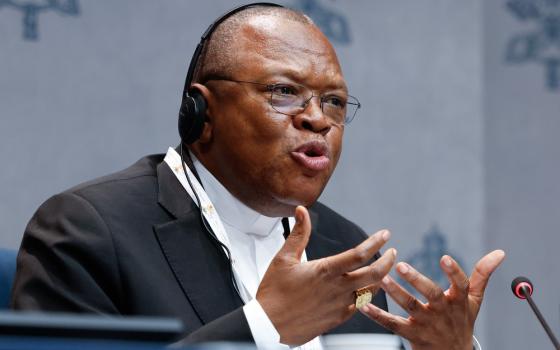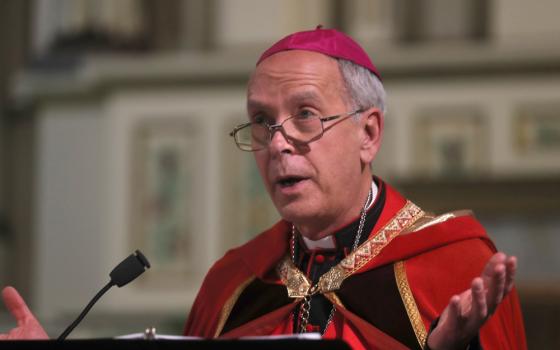
Jerusalem
News Analysis
tPope Benedict XVI's visit yesterday to Yad Vashem, Israel's main Holocaust memorial, had been billed coming into this trip as a make-or-break moment, a key test of whether the pontiff could mend fences with Jews after several recent setbacks. This morning, the lead commentary in Haaretz, Israel's leading daily, carried this reaction: "Benedict's speech showed verbal indifference and banality."
Safe to say, that's not exactly the headline the Vatican was hoping for.
To be sure, other Jewish commentators so far have been far more positive, accenting the importance of the pope's choice to visit Yad Vashem and his firm commitment to Holocaust remembrance. A striking number of critical voices, however, saw the visit as a missed opportunity. (Notably, those voices included the chairman of the board of directors at Yad Vashem.)
Aside from some relatively minor points of word choice – that Benedict said Jews had been "killed," not "murdered," and that "millions" of Jews died rather than "six million," even though he cited that figure in an earlier speech at the Tel Aviv airport) – the main thrust of the criticism centered on three points missing from the speech:
- Acknowledgment of the role that Christian anti-Semitism played in shaping attitudes that led to the Holocaust;
- Reference to Benedict's own biography as a German who saw the horrors of the Nazi regime with his own eyes, and who had himself been drafted into the German army;
- Regret for the recent strain in Catholic/Jewish ties caused by the lifting of the excommunication of four traditionalist bishops, including one, Richard Williamson, who is a Holocaust denier.
For the record, Benedict did not hit any of these points today either during his visit to Jerusalem's fabled Western Wall. In 2000, John Paul II left a note in the Western Wall asking forgiveness for "the behavior of those who have caused these children of yours to suffer." This morning, Benedict XVI left a note asking God to "send peace upon this Holy Land, upon the Middle East, upon the entire human family."
Since it was entirely predictable that the absence of these three points from the Yad Vashem speech would stir reaction, the $64,000 question becomes: Why didn't Benedict say it?
It would be easier to answer if it were clear that Benedict didn't actually think these things – that is, if he didn't believe that anti-Semitic attitudes among Christians played any role in the Holocaust, or that his personal experience is irrelevant to what Yad Vashem symbolizes, or if he felt no regret for the Williamson affair. Then his decision not to say them would make all the sense in the world.
In fact, however, Benedict is on record as thinking and saying the precise opposite.
In December 1990, then-Cardinal Joseph Ratzinger wrote a blunt essay for L'Osservatore Romano acknowledging that too many Christians failed to resist the lure of anti-Semitism, and that this failure contributed to the Holocaust. In his autobiography Milestones, he wrote at length about the lessons he learned from growing up in the shadow of Hitler and the Nazis, and during his 2006 visit to Auschwitz he spoke of the significance of being "a German pope" and "a son of Germany" in that place. Just weeks ago, he addressed a letter to all the bishops of the church expressing his deep anguish over the Williamson case.
So once again, the inevitable question: Why didn't he say any of this at Yad Vashem?
Jesuit Fr. Fedrico Lombardi, the Vatican spokesperson, attempted to answer that question in a session with reporters today in Jerusalem.
"He does not have to repeat every time, in every speech, all the points he has made in the past about the tragedy of the Holocaust," Lombardi said. "Many people who have not listened on other occasions to what the pope has said expect him to repeat it every time, but this is not possible."
That's certainly a point. Yet inevitably, there's a difference between saying it in an article in L'Osservatore Romano or in a letter to bishops, and saying it at Yad Vashem – when virtually every major news network in the world is carrying the event live, and when it's one of the rare occasions when the pope has unfiltered access to the Israeli and Jewish "street."
One could argue, of course, that Benedict did not want to tarnish the significance of the Yad Vashem visit by using his speech to put out fires or score PR points. It's also true that Benedict is legendary for thinking in centuries, implying that his main concern is rarely what tomorrow's headline might be.
Yet Lombardi seemed to hint at a deeper logic for the way Benedict chose his words. The theme of the speech, Lombardi insisted, was "memory," and that's where the pontiff placed his focus.
In fact, the most dramatic line from the speech came near the end. Meditating aloud on the sight of the reflecting pool at Yad Vashem, where the faces of Holocaust victims gaze back at visitors, Benedict said the memory of those who were lost "is a cry raised against every act of injustice and violence … a perpetual reproach against the spilling of innocent blood."
Perhaps the key words in that line of thought are "every" and "perpetual." At monuments to evil such as Auschwitz and Yad Vashem, Benedict seems compelled to offer reflections which are deliberately universal and timeless.
In both cases, he clearly acknowledged the specificity of Jewish suffering in the Holocaust, and resolved to ensure that such crimes are never repeated. Nonetheless, Benedict XVI seems to see such settings – not just Holocaust memorials, but also, for example, the site of the 9/11 terrorist attacks in New York, which he visited last April – as eternal reminders of the seductive power of hatred. One has the impression that to him, it would fail to do justice to what these places represent if he were to turn the focus upon himself, or recent events and plans of action, or even too much on the historical particularities of the location.
In a sound-bite, he seems to believe that occasions for grappling with the deepest and most painful mysteries about God's plan require something more from a pope than good image management.
Put that way, of course, it sounds quite noble. The fly in the ointment is that Benedict is nonetheless pope in the here and now, and whatever he does and says – or, in this case, fails to say – has immediate real-world consequences: For inter-faith relations, for the public image of the Catholic church, for his capacity to get a hearing, and across the board. Thinking in centuries when you speak in public is a marvelous academic disposition, but it can be a tricky business for a leader on the global stage.
Whatever one makes of Benedict's approach to these moments, however, one thing seems clear after four years, which has been reinforced this week: This is who Benedict XVI is, and he's not likely to change simply because day-after headlines don't break his way.
-------------------------------------------------------------
John L. Allen Jr. is NCR senior correspondent. His traveling with Pope Benedict XVI in Jordan, Israel and the Palestinian Territories May 8-15. Read NCRonline.org daily for his dispatches from the Holy Land.
The stories he has filed so far:
Benedict rides 'peace train' to Nazareth (May 14)
Church in Israel struggles to find its Hebrew voice (May 14)
Today, Benedict belonged to the Palestinians (May 13)
Pope strikes new balance in the Old City (May 12)
The pope and the Hitler Youth, in Benedict's own words (May 12)
Analysis: Benedict's timeless touch noble, but tricky (May 12)
At Yad Vashem, what pope doesn't say makes waves (May 11)
Pope in Israel mends fences, but doesn't pull punches (May 11)
Pope calls on Mideast Christians to perservere (May 10)
Benedict XVI sets new papal record for mosque visits (May 9)
Even in Jordan, Christian-Muslim ties not always easy (May 9)
Emphasis on Islam makes pope's trip an original (May 8)
Five challenges await pope on Middle East swing (May 7)
Pope's Holy Land pilgrimage a huge roll of the dice (May 7)


